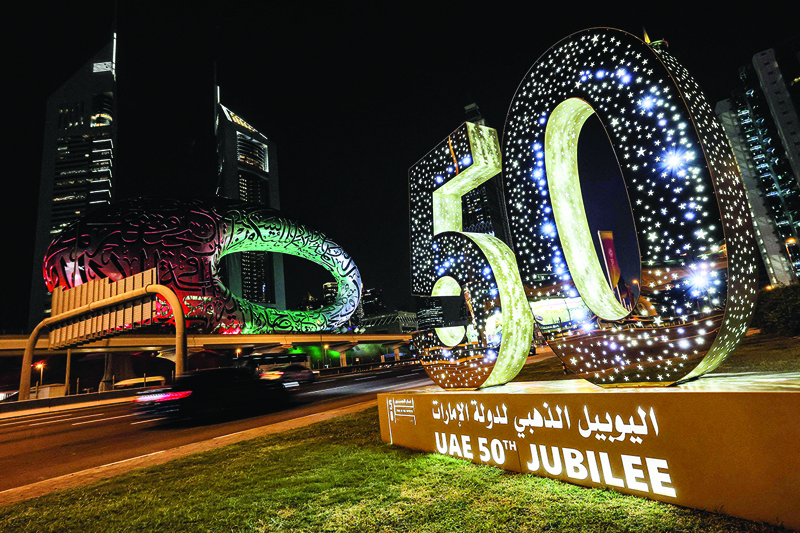 DUBAI: A sign marking the UAE's 50th jubilee is lit up along the side of Sheikh Zayed Road on Dec 1, 2021. - AFP
DUBAI: A sign marking the UAE's 50th jubilee is lit up along the side of Sheikh Zayed Road on Dec 1, 2021. - AFP
DUBAI: The United Arab Emirates is slashing its official working week to four-and-a-half days and moving its weekend to Saturday and Sunday in a major shift aimed at improving competitiveness, officials said yesterday. The "national working week" is mandatory for government bodies from Jan 1 and bucks the regional norm of a full day off on Friday for Muslim prayers.
Scott Livermore, chief economist at Oxford Economics Middle East, an advisory firm, said businesses could choose their working week but were likely to align with the public sector. While becoming the only Gulf country not to have a Friday-Saturday weekend, the resource-rich and ambitious UAE now comes into line with the non-Arab world.
Under the new timetable, the public-sector weekend starts at noon on Fridays and ends on Sunday. Friday prayers at mosques will be held after 1:15 pm. The move, which also includes schools, is intended to "better align the UAE with global markets", said state news agency WAM, calling the new working week the world's shortest. "The UAE is the first nation in the world to introduce a national working week shorter than the global five-day week," it said.
The Western-style weekend, rumored for years, was announced less than a week after the former British protectorate celebrated the 50th anniversary of its formation. The UAE observed a Thursday-Friday weekend until 2006, when it moved to Fridays and Saturdays. "The extended weekend comes as part of the UAE government's efforts to boost work-life balance and enhance social wellbeing, while increasing performance to advance the UAE's economic competitiveness," the WAM report said. It added that the change "will better align the UAE with global markets, reflecting the country's strategic status on the global economic map."
The new arrangement is another bold step for the UAE, which last year broke with decades of Arab consensus by normalizing relations with the Zionist entity, unlocking hundreds of millions of dollars in trade. It gives the UAE the jump on regional competitors including neighboring Saudi Arabia, the Arab world's largest economy which is seeking a greater international presence as it diversifies its economy away from oil.
The changed week was generally welcomed on social media, where the subject was trending and the official announcements were widely retweeted. Manoj, an IT worker in Dubai's Business Bay district, said the Friday-Saturday weekend had long caused problems when working with clients in different countries. "I think it's a great step because collaborating with different clients overseas always provides a problem, because we are not working on Fridays and they are not working on Sundays," he said. "So there is a gap of like three days before we actually sync up."
Monica, a financial sector worker, said: "I think it's good from an international point of view that we are in line with the world, with the globe. "And in terms of having the extra half-day on Friday, I think it works well because it will give us more time with family."
Livermore, of Oxford Economics Middle East, told AFP the alignment with Europe and Asia "will help internationally orientated business that are an important pillar of the economy and could attract investment." At the same time, "a shorter working week does present some challenges in terms of managing output costs, although there is some evidence that a shorter working week can boost productivity of the workforce," he added. - AFP

